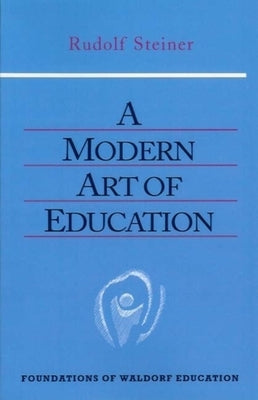Description
14 lectures and talks, Ilkley, Yorkshire, August 5-17, 1923 (CW 307)
In this fine introduction to Waldorf education, written out of a series of lectures given in 1924, Steiner provides one of the most comprehensive introductions to his pedagogical philosophy, psychology, and practice. Steiner begins by describing the union of science, art, religion and morality, which was the aim of all his work and underlies his concept of education.
Against this background, many of the lectures describe a new developmental psychology. On this basis, having established how children's consciousness develops, Steiner discusses how different subjects should be presented so that individuals can grow and flourish inwardly. Only if the child absorbs the right subject in the right way at the right time can the inner freedom so necessary for life in the modern world become second nature.
"Readers of Steiner's lectures printed here will be 'quietly astonished' and 'genuinely enthusiastic.' After an introduction, in which he speaks of reuniting science (intellectual knowledge), art, and morality once again, he turns to the principles of Greek education, in which body, soul, and spirit were still a unity. He then traces the development through the Middle Ages, during which new, evolving elements were added. In our time, he says, we must understand the concrete connection of the spirit with the human being, so that thinking, feeling, and willing can once more become alive. He relates this to the child's developmental stages, as well as the human basics such a sleeping and waking. Then he turns to the specifics of the curriculum: reading, writing, nature study, arithmetic, geometry, history physics, chemistry, crafts, language, and religion. Finally, he turns to memory, the temperaments, physical culture, art, and the actual organization of a Waldorf school--to which this volume is, all in all, one of the best introductions." --Christopher Bamford, from his introductionGerman source: Gegenwärtiges Geistesleben und Erziehung (GA 307). Previous English edition: Education and Modern Spiritual Life.
About the Author
Steiner, Rudolf: - Rudolf Steiner (1861-1925) was born in the small village of Kraljevec, Austro-Hungarian Empire (now in Croatia), where he grew up. As a young man, he lived in Weimar and Berlin, where he became a well-published scientific, literary, and philosophical scholar, known especially for his work with Goethe's scientific writings. At the beginning of the twentieth century, he began to develop his early philosophical principles into an approach to systematic research into psychological and spiritual phenomena. Formally beginning his spiritual teaching career under the auspices of the Theosophical Society, Steiner came to use the term Anthroposophy (and spiritual science) for his philosophy, spiritual research, and findings. The influence of Steiner's multifaceted genius has led to innovative and holistic approaches in medicine, various therapies, philosophy, religious renewal, Waldorf education, education for special needs, threefold economics, biodynamic agriculture, Goethean science, architecture, and the arts of drama, speech, and eurythmy. In 1924, Rudolf Steiner founded the General Anthroposophical Society, which today has branches throughout the world. He died in Dornach, Switzerland.Bamford, Christopher: - Christopher Bamford is Editor in Chief Emeritus for SteinerBooks (Anthroposophic Press) and its imprints. A Fellow of the Lindisfarne Association, he has lectured, taught, and written widely on Western spiritual and esoteric traditions. He is the author of The Voice of the Eagle: The Heart of Celtic Christianity (1990) and An Endless Trace: The Passionate Pursuit of Wisdom in the West (2003). He has also translated and edited numerous books, including Celtic Christianity: Ecology and Holiness (1982); Homage to Pythagoras: Rediscovering Sacred Science; and The Noble Traveller: The Life and Writings of O. V. de L. Milosz (all published by Lindisfarne Books). HarperSanFrancisco included an essay by Mr. Bamford in its anthology Best Spiritual Writing 2000.
Wishlist
Wishlist is empty.
Compare
Shopping cart


